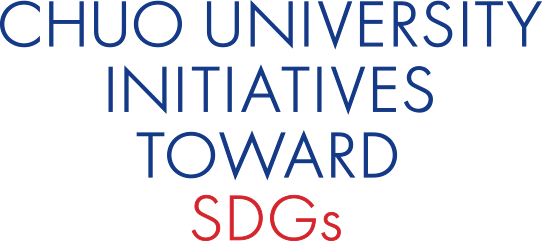Chuo University supports the ideas represented by the Sustainable Development Goals and declares that it will engage fully in activities to contribute to the sustainable and fair/equitable development of society.
Chuo University has chosen 'Fostering the Ability to Apply Knowledge to Practice' as its founding principle and has, since its establishment in 1885, fostered a tradition of evidence-based approaches to solving real-world problems. The academic institution Chuo University encompasses a university with eight faculties, two professional graduate schools and nine graduate schools, and in addition four high schools and two junior high schools. Through these connected parts, it conducts research in a wide range of fields and maintains varied educational programs
Contributing to the sustainable and equitable development of society is a mission of the utmost importance for research and education at Chuo University. We acknowledge that the type of development that has taken place at a global scale has led to inequity in income and to gaps in economic wealth as well as to environmental destruction. We believe that we have the responsibility to act now in order to ensure that a sustainable future can be built.
The United Nations adopted the Sustainable Development Goals in 2015. They comprise 17 goals which are subdivided into 169 targets and are measured using a total of 232 indicators. By pursuing these goals, global human society strives to solve the problems it faces and to achieve a sustainable world by 2030. Core concepts of this approach are 'inclusion' and 'no one left behind'.
Taking into account these aspects, Chuo University takes action according to the following four guidelines in order to contribute to the sustainable and equitable development of society.
Firstly, among all the SDGs Chuo University promotes in particular SDG 4 'ensure inclusive and equitable quality education and promote lifelong learning opportunities for all' as a priority for all faculties and schools within its organization. All parts of the organization will pursue SDG 4 in concordance with the full set of Sustainable Development Goals.
Taking advantage of the particular strengths of an integrated academic institution, with programs linking high school and university level education, we will further promote education about human rights, gender and sexuality.
Secondly, being aware of the importance of taking the expert knowledge harboured by Chuo University and applying it to the SDGs, we will encourage research that focuses on the SDGs and supports them from various directions.
Thirdly, as an organization that is embedded in society at large, Chuo University pledges to take environmental aspects into consideration as part of all decision-making processes and activities, establishing compatibility with the SDGs as a fundamental standard. The management of human resources, the establishment and maintenance of facilities, and all aspects of consumption of goods and energy shall be checked for compliance with the SDGs, establishing a system for continuous assessment and improvement. In addition, the university will also call on its suppliers and contractors to evaluate their own activities with regard to the SDGs.
Fourthly, we will work with individuals and institutions that also engage in activities related to the SDGs. By connecting our students, pupils and staff with family members, graduates, local communities, businesses, government offices and international partners, we will fulfill our commitment to society through assessment, evaluation and outreach.
Finally, we are aware that succeeding in the four areas of engagement listed above depends greatly on collaboration with the many individuals who are involved with the activities of Chuo University. We therefore call on everybody to join us in our efforts and to actively promote the guiding principles of 'inclusion' and 'no one left behind'.
